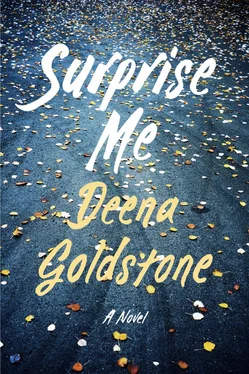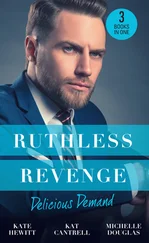“Wouldn’t we all,” Bev agrees. Then: “Now tell me about Michael. I know even less about him.”
And so Isabelle describes Michael to her — his goodness, what her father would call his steadfastness. How he’s almost courtly in the way he takes care of her, opening doors, bringing her a sweater when she’s sitting outside and the evening turns cool, taking her feet in his hands at the end of a day as they sit on the living room sofa telling each other their stories of their day and rubbing the tiredness away as they talk, attending to her without making a big deal of it. Small gestures that speak of a great kindness.
She tells Bev that they talked about having a child together, but they married when Isabelle had finally committed to her writing again, after she had been back to visit Daniel, when she had met Bev.
“Of course, I remember,” Bev tells her.
And Isabelle was afraid that another child would displace her writing once again, as Avi had, and Michael understood. And never blamed her when they put away the question of having a child.
“You can see how lucky I am.”
“He sounds like perfection.”
“He worries. A lot. It drives me crazy. And he doesn’t like people much, at least not in a group. One-on-one isn’t so hard for him. He’d rather read in his study than take a walk. He refuses to buy himself new clothes. His initial reaction to anything new is no, but he thinks about it again, I’ll give him that. He eats a limited number of foods, and to get him to a new restaurant is a major campaign. He doesn’t understand the concept of risk. He—”
And here Bev stops her, laughing. “Okay, okay — he’s a human being.”
“A mixed bag like all of us, but I make him happy, Bev, I can see that. Really all he wants is for us to be together. And I feel the same way.”
And Isabelle tells her how, over the years they’ve been married, she has come to rely on Michael more and Daniel less. That there’s been a sort of easing between Daniel and her — not a lessening of affection but an appropriate burrowing into their own lives.
“I’ve seen that,” Bev says.
“And of course he’s had you.”
“But when you finished your book and then got it published”—a grin crosses Bev’s face when she thinks about it—“he’d stop people in the street, perfect strangers, wherever we were — Daniel talking to people he didn’t know and didn’t have to talk to! — and tell them to go buy the book. Immediately! He wouldn’t stop talking about it until they promised. He was so proud of you.”
“I know that.”
“They’ve been good years,” Bev says, summing up the last decade for both of them.
“Yes,” Isabelle agrees, “they’ve been very good.”
The women ride in silence, memories of the past decade giving them some solace. Then Bev tries to explain, certain that if anyone can understand, it will be Isabelle, “All those difficult years Daniel spent before he came here, they helped create a…” And she hesitates, trying to find exactly the right word. “A grateful man.”
“I saw that man the last time I was here. He was so genuinely happy to be here, to have his panic in retreat, to have his class to teach.”
“Oh, the women loved him.”
“I’ll bet.” They grin at each other, and then Isabelle adds quietly, “To be able to write again.”
Bev nods and then pulls them back to the mission at hand, “But not now.” The three words are clipped, like the top of a hinged box snapping shut.
And then Daniel is between them again, in the car with them, the Daniel of today, who is dying and angry and desperate to work but unable to.
“Can you work a miracle, Isabelle?”
Isabelle doesn’t answer; there is no answer. The two women turn away from each other, look out their separate windows, take in the fading of this radiant summer’s day as they drive toward the difficulty ahead of them.
Alina is waiting for them as they pull up outside the barn late in the afternoon, shadows cutting the gravel driveway in half. She’s there to stop Isabelle from marching into Daniel’s cottage without speaking with her first.
She looks undone — that’s the only word Isabelle can come up with as she gets out of Bev’s car and takes a good look at the woman waiting for her. Undone, desperate, the impending loss of the father she has never reconciled with eviscerating her.
But there is, of course, no acknowledgment from Alina of what she’s feeling or the difficulty of this trip for Isabelle, and there’s no small talk. Not even a How was your flight? or Was there a lot of traffic? or the common courtesy of How are you?
“He doesn’t know you’re coming,” Alina says by way of greeting as Isabelle approaches.
“And why is that?” Isabelle asks.
“Because he would have told me not to call you, not to have you bother to fly across the country to see a sick old man die.”
Isabelle looks at Bev. Is that true?
“Sounds about right,” Bev says.
“What are you going to say to him?”
“I don’t know, Alina. What do you think?”
Daniel’s daughter shakes her head. “I’ve never known what to say to him.”
Bev and Isabelle share a quick look: something to be discussed later.
“You need to do it, Isabelle. You need to figure out why he put the book away and you need to get him to finish it.”
“I don’t know if I can accomplish—”
“It’s the only thing that matters to him!”
Another quick look between Bev and Isabelle: the only thing? What about the three women who have come together to tend to him? How can Alina really believe that none of them matter to him?
“Let me see how things go,” Isabelle says, and Alina nods, satisfied.
—
AS SHE WALKS ACROSS THE GORGEOUSLY blooming meadow separating the barn and Daniel’s cottage, Isabelle searches frantically for something to say, for the right something to say, but comes up completely empty. There’s no way to make this better, and there’s no way that the Daniel she’s known and loved for twenty years would stand for one false sentiment from her. Words fail her. Her heart is pounding. She’s afraid of what she will find. She’s afraid she’ll be inadequate in the face of it.
She doesn’t knock but opens the wooden door softly, stooping a little as she crosses into the cabin. She sees him immediately. He’s asleep on the blue sofa, covered with a blue-and-white afghan that Bev probably knitted. An oxygen cannula rests in his nostrils, and the clear plastic tubing is looped around his ears to hold it in place. The line travels to a large green canister positioned by the fireplace.
He’s gaunt, having lost so much weight that the bones of his shoulders seem to push through his skin, and there’s a shadow over his face, a caul, which tells her he’s dying. She moves soundlessly and takes a straight-backed kitchen chair and positions it alongside the sofa, so that when Daniel wakes, he will see her sitting there. And then she waits.
The light from the long windows begins to turn purple as the day moves into evening and the sounds of the country, which are so unfamiliar to her, fill up the air — the ruffle of the water against the banks of Foyle’s Pond, the harsh call of a bird of prey, maybe a hawk. And then, in the distance, the howling of what must be a coyote and the answering call from another farther away. Mournful and unnerving.
Isabelle sits without moving and watches Daniel sleep. His breaths take effort, but they are consistent and rhythmic. She’s grateful to find her panic subsiding in the quiet room, pushing ahead of it the worst of her fear. He’s still Daniel. She still loves him. If she can hold on to those facts, she might be able to do this. And then he opens his eyes, when she is as ready as she’s ever going to be.
Читать дальше












